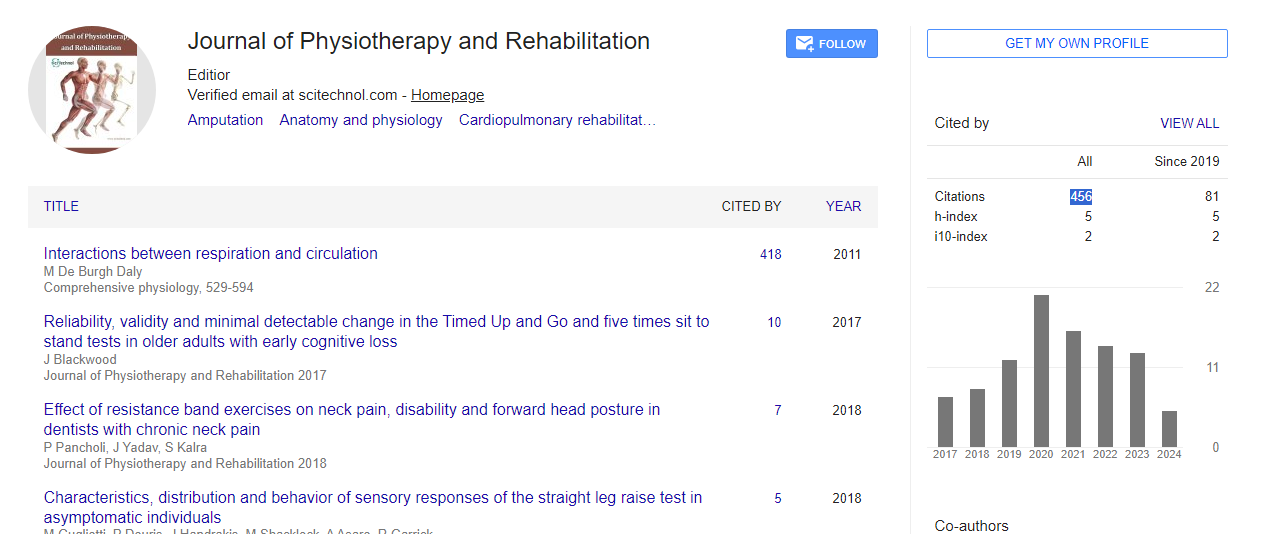Commentary, J Physiother Rehabi Vol: 8 Issue: 4
Family-Centered Approach to Pediatric Physical Therapy: How Involving Parents and Caregivers Enhances Therapeutic Outcomes and Supports Child Development
Regimen Matt*
1Department of Physiotherapy, State University of the Midwest (UNICENTRO), Santa Cruz, Paraná, Brazil
*Corresponding Author: Regimen Matt,
Department of Physiotherapy, State
University of the Midwest (UNICENTRO), Santa Cruz, Paraná, Brazil
E-mail: matre@gimen.br
Received date: 23 July, 2024, Manuscript No. JPTR-24-147317
Editor assigned date: 25 July, 2024, PreQC No. JPTR-24-147317 (PQ);
Reviewed date: 08 August, 2024, QC No. JPTR-24-147317
Revised date: 15 August, 2024, Manuscript No. JPTR-24-147317 (R);
Published date: 22 August 2024, DOI: 10.4172/JPTR.1000173.
Citation: Matt R (2024) Family Centered Approach to Pediatric Physical Therapy: How Involving Parents and Caregivers Enhances Therapeutic Outcomes and Supports Child Development. J Physiother Rehabi 8:4.
Description
Pediatric physical therapy plays an important role in supporting the development and well being of children with various physical and developmental challenges. Traditionally, therapy has focused on the child’s needs and progress within the clinical setting. However a family centered approach to pediatric physical therapy is increasingly recognized as important for optimizing therapeutic outcomes and caring for overall child development. By actively involving parents and caregivers in the rehabilitation process, therapists can create a more supportive environment that enhances both the effectiveness of interventions and the child’s quality of life. Involving parents and caregivers in the development of therapy goals and plans ensures that the interventions are customized to the child’s unique needs and the family’s context. Parents bring valuable insights into their child’s daily routines preferences and challenges which can help therapists design more effective and individualized treatment plans. When families are engaged in setting goals they are more likely to be invested in the therapy process leading to better attachment and more successful outcomes.
Consistency is important in pediatric physical therapy and having parents and caregivers involved in the daily implementation of therapeutic exercises and strategies can significantly enhance progress.
By providing parents with clear instructions and training on how to carry out exercises at home therapists ensure that the therapeutic activities are consistently assisted outside of clinic sessions. This reinforcement helps to solidify the gains made during therapy and accelerates the child’s overall progress. Children often respond positively to therapy when they receive encouragement and support from their family. Parents and caregivers play an important role in providing emotional support and motivation which can be particularly important during challenging phases of therapy. Positive reinforcement from loved ones can boost a child’s confidence and willingness to engage in therapeutic activities contributing to better outcomes.
Family centered care also involves addressing the needs and concerns of the family as a whole. Therapists can provide support and resources to help families manage the demands of therapy alongside other responsibilities. This might include connecting families with support groups providing educational resources or offering guidance on navigating healthcare systems. By reducing the stress and burden on families therapists can create a more supportive environment that enhances the overall effectiveness of therapy. A family centered approach supports the integrated development of the child by incorporating therapy into the broader context of the child’s life. When parents are involved in therapy they can integrate therapeutic activities into everyday routines promoting skill development in naturalistic settings. This integration helps children apply what they have learned in therapy to real-life situations supporting their overall growth and development. Engaging in therapy together can strengthen family bonds and improve family dynamics. Shared experiences in the therapy setting provide opportunities for families to work together towards common goals caring for a sense of unity and collaboration. This strengthened connection can positively impact the child’s emotional and social development as well as the family’s overall wellbeing.
Conclusion
A family centered approach to pediatric physical therapy offers numerous benefits for both children and their families. By involving parents and caregivers in the therapeutic process, therapists can enhance the effectiveness of interventions support the child’s comprehensive development and strengthen family bonds. This collaborative model not only improves therapeutic outcomes but also care more supportive and empowering environment for families.
 Spanish
Spanish  Chinese
Chinese  Russian
Russian  German
German  French
French  Japanese
Japanese  Portuguese
Portuguese  Hindi
Hindi 